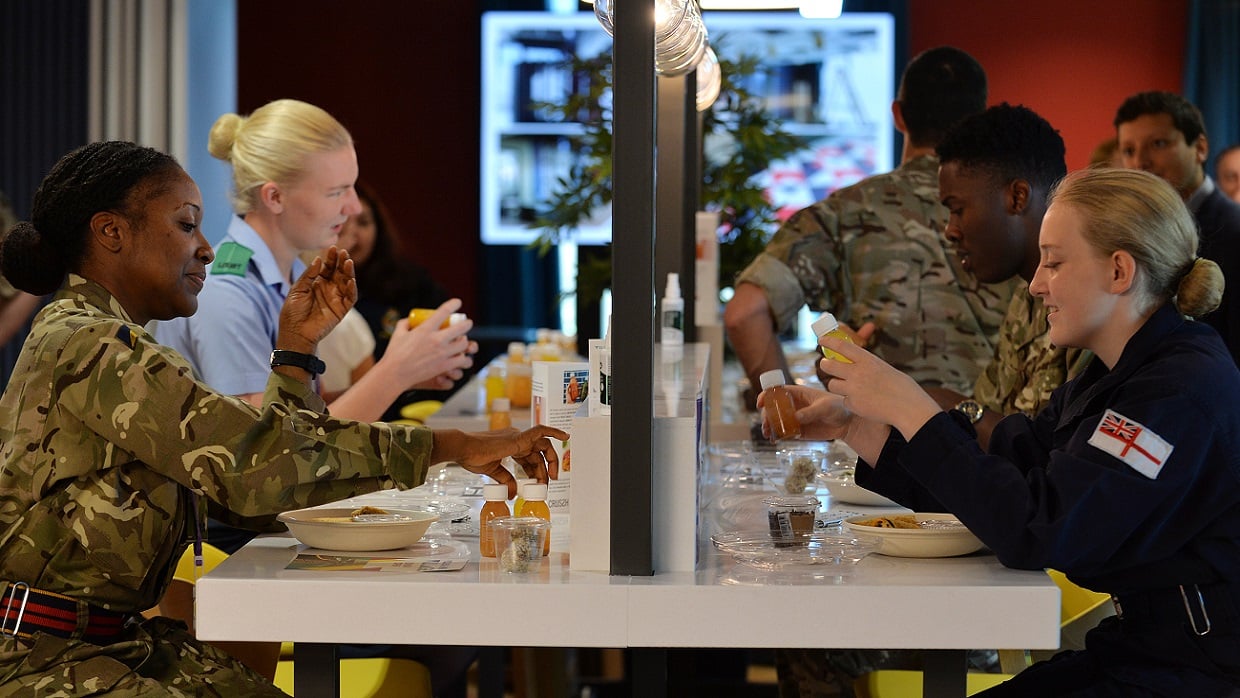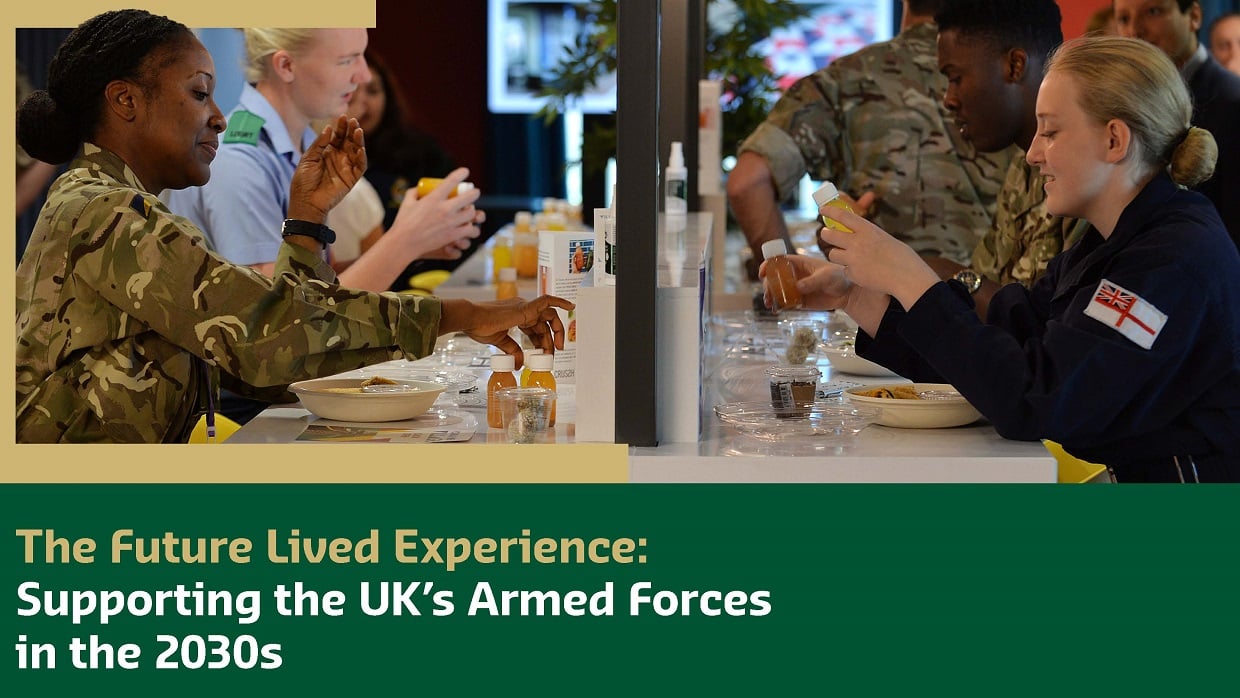Report recommends key changes to Armed Forces Lived Experience

New paper reveals how the lives of defence personnel in the UK can be improved into the 2030s according to a group of Serving Personnel, veterans, academics and industry partners convened by Sodexo.
- The recommendations follow research conducted by Sodexo on the current Lived Experience, carried out through one-to-one interviews and roundtables with over 100 participants representing a cross section of serving Armed Forces personnel of all levels, as well as academics, representatives from the third sector and other strategic partners operating within the industry.
- The recommendations also took into account the results of Sodexo’s 2024 Annual Defence Survey which collates feedback from around 6,000 military personnel across tri-Service locations at which it delivers services.
- Recommendations include significant improvements to accommodation, food offering, and more consistent access to local services.
- There were also calls for greater technology integration to improve the experience of forces families and a more prominent role for Armed Forces bases in their communities.
- The report is released at a time when the combined full-time trained strength of the UK Armed Forces is rapidly decreasing, with a net loss of 3,620 personnel in the space of a year to a total of 127,040, and 41% of personnel now actively looking for a new role outside the Forces.
Research by leading food and facilities management services provider, Sodexo, has sought to address growing concerns regarding the Lived Experience of members of the Armed Forces based in the UK.
The report, titled ‘The Future Lived Experience: Supporting the UK’s Armed Forces in the 2030s’, is the latest step in Sodexo’s ongoing research and solution development in the defence industry. Download it here
The report’s purpose is to support the ongoing work of the Armed Forces in their recruitment and retention drives, ensuring that those living and working on military bases have the best possible Lived Experience. It comes at a time when the combined full-time trained strength of the UK Armed Forces is rapidly decreasing.
Overall figures released by the Ministry of Defence show the combined full-time trained strength of the UK’s Armed Forces decreased by 3,620 personnel to a total of 127,040 between January 2024 and January 2025 . Meanwhile, 41% of personnel are now actively looking for a new role outside the Forces .
Research instigated by Sodexo has drawn up a series of ten recommendations to improve the Lived Experience, covering areas of Armed Forces life from accommodation and food to internet access and the provision of childcare.
A major theme to emerge is the need for policy change to account for the evolution of modern family life and personal relationships. A key recommendation in the report is the creation of so-called ‘family passports’. These would combine existing data on health needs, the education stage of children, and housing requirements to ensure continuity and a seamless transition between defence sites as families are transferred.
Recommendations also look at the role of food and accommodation as the essentials of a “modern, stable” Lived Experience within the Armed Forces. The report advocates a minimum, universal measure of the quality of the Lived Experience to ensure consistency across the Defence estate.
A further recommendation covers the role of military establishments in local communities and makes clear the need to better engage with those ‘outside the wire’ to improve the image of the Armed Forces and encourage more young people to consider defence careers.
2 https://www.gov.uk/government/statistics/armed-forces-continuous-attitude-survey-2025
3 See Notes to editor for full list of recommendations
As a facilities management company with deep links to the Armed Forces community, we see it as our duty to work with partners and colleagues to deliver a Lived Experience standard that a modern military population expects, and of which we can be proud.
In response to this, and in line with the government’s ‘One Defence’ strategy, we have embarked on this ambitious programme of research as we look ahead to the 2030s and beyond and consider the changing nature of Defence people and their needs.
This forms part of our wider body of research and solution development in the defence space which clearly shows that the Lived Experience is critical to the happiness and success of our Armed Forces.
The ten recommendations to improve the Lived Experience outlined in the report: ‘The Future Lived Experience: Supporting the UK’s Armed Forces in the 2030s’ are:
- Family passports should be created to ensure continuity and a seamless transition between defence sites using existing data from the Joint Personnel Administration System. This should be implemented as part of the new Defence Human Resources System (DefHRS) which will replace JPA in early 2027.
- Military establishments should work towards providing more equitable early years provision across bases and allow greater flexibility for working parents.
- Encourage military establishments to make active contributions to local communities. This could be through partnerships with schools and colleges or by nominating at least one community project each year to sponsor with labour or services from the base.
- The Ministry of Defence should conduct a review of the risk appetite for allowing partners of unmarried personnel, outside groups and members of the community onto base and streamline the permissions process, leveraging technology where necessary.
- The Ministry of Defence should continue its work towards creating a clear minimum, universal service level for all Armed Forces accommodation to demonstrate commitment to improving standards and provision for all, including families and couples.
- Where not already in place, base commanders should be encouraged to establish open forums where issues and quick wins affecting the Lived Experience within the Armed Forces can be discussed and actioned with senior base management representation. Representation of women and other minority groups is critical to ensure all demographics serving have a voice.
- Give families greater choice and access to consistent information about new military establishments and accommodation. The present system of Service Families Accommodation should be maintained and more consistently used across military establishments.
- Ensure personal Wi-Fi meets the standard and cost that would be expected in civilian life. A review of the current wireless internet provision available for personal use by service persons should be conducted by the Ministry of Defence if not already underway.
- External catering providers should provide greater flexibility, choice and transparency to allow serving personnel to make informed decisions about their food and improve provision for different food cultures, particularly considering Commonwealth Personnel.
- Create a forum for more regular engagement between the Ministry of Defence and providers and users of similar Lived Experience services to gauge wider standards within the sector, looking to better align with examples such as higher education institutions.
The recommendations of this report speak to the candid nature of the conversations we were able to have with people from across the military rank structure and the Civil Service, as well as academics, those in the third sector, and peers in the facilities management industry.
Combined with our Annual Defence Survey, this valuable insight into the views of a wide range of stakeholders sheds new light on what is expected of the Lived Experience, and how we can best anticipate the needs of our Armed Forces into the 2030s and beyond.
Many of our findings will not be new news to those in Armed Forces leadership. However, we feel the detail of this report represents not just the evidence but a constructive discussion of options that will address issues with the Lived Experience.
At a time when recruitment and retention pose a significant challenge, the Lived Experience of those in our Armed Forces is under more scrutiny than ever.
We look forward to working with the Armed Forces and our other partners to further influence this discussion and play our part in creating the Lived Experience that our Armed Forces deserve.

About the research
As part of Sodexo’s commitment to close collaboration with government, the Armed Forces, and other relevant stakeholders, it hosted the Lived Experience Forum, in late 2024 in London, to discuss the issues impacting the lived experience of personnel living in Ministry of Defence facilities across the UK.
The discussion was based around three key questions defined at an earlier roundtable of currently serving and retired military personnel, academia, industry experts, and the charitable sector, and captured in a subsequent white paper The Future Lived Experience and the UK’s Armed Forces in the 2030s. These questions were:
- How can we improve the Lived Experience through breaking down barriers between the Armed Forces and the society they serve?
- How can we improve the Lived Experience to meet the changing expectations of Armed Forces personnel?
- How can we improve the Lived Experience through external partnerships with organisations?
Participants at The Lived Experience Forum included individuals from across defence, industry, academia and the third sector, who were tasked with exploring the issues in the White Paper.
The diverse group transcended rank, age, background, geography and service branch. Given this, some issues outlined in this report may not always be relevant to all service branches. Indeed, the focus on more junior ranks may also highlight issues where insufficient communications regarding systems or policy may be a barrier, rather than a lack of policy in and of itself.
The day was designed to allow all participants to express their views freely and openly. To that end, serving personnel were asked to not wear uniforms, and rank was not used throughout the day.
Participants were split into smaller groups to ensure all were comfortable contributing and could hear different perspectives throughout the day. Each group was facilitated by a moderator, for whose significant contribution and support we thank them. Our moderators were:
- Brigadier Mark Ackrill – Head of People Strategy, Chief of Defence People
- Air Commodore Claire O’Grady – Deputy Air Officer Commanding No. 2 Group, Royal Air Force
- Caroline Hull – Strategic People Partner, University of the West of England. Previously Head Armed Forces & Veterans Services (Brigadier)
- Prof Michael Almond – Professor of Veterans and Families Studies, Anglia Ruskin University; Chair, Essex Reserve Forces and Cadets County Forum
This report builds on and should be used to complement and support the many other reviews and pieces of work currently underway to improve the Lived Experience across the Defence Estate.
Find out more and download the report